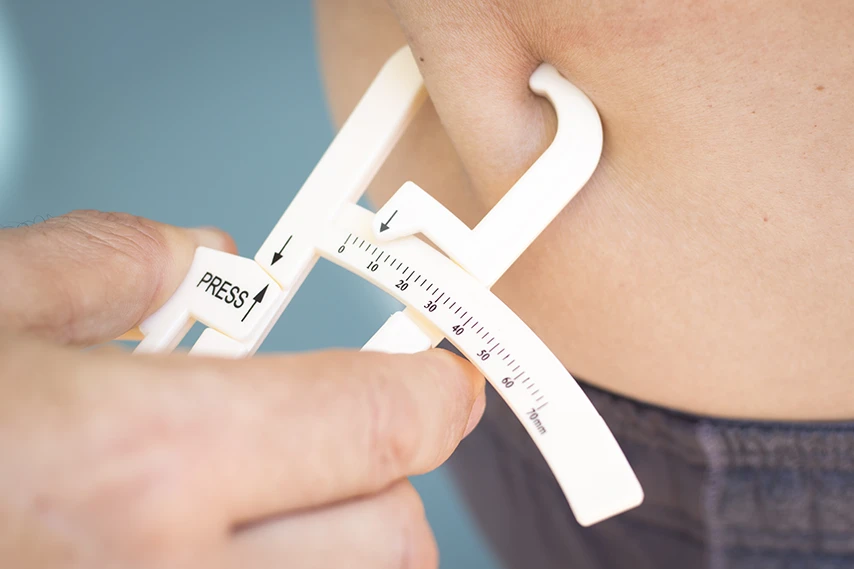Signs of a Fast Metabolism: 10 Things to Look Out for

A fast metabolic rate means you burn more calories than the average person. Your body is constantly using fat to maintain high energy levels.
Some people don’t realize they have a fast metabolism until they notice signs like unintentional weight loss, fatigue, and constant hunger throughout the day. It’s especially difficult for people to put on weight because they have to consume twice the amount of food.
If you experience similar symptoms, it’s possible that you’re burning extra calories. Discover the 10 signs of a fast metabolism and how it affects your overall health.
10 Signs That You Have a Fast Metabolism
Not everyone with a fast metabolism experiences the same symptoms, but it’s common to have a greater appetite and lower body fat percentage. Learning about the different signs can help determine whether you need more calories.
Below are 10 signs that you have a fast metabolism:
#1 Sweating
Sweating is a sign that your metabolism is very active. People with a fast metabolic rate produce more thyroxine – a chemical that regulates energy conversion. This chemical can also make you sensitive to heat, which causes excessive sweating in warmer environments.
When your body is constantly burning fat for energy, it’s bound to make you sweat. It’s believed that excess thyroxine increases the risk of hypothyroidism. A side effect of hypothyroidism is sweating, as the thyroid gland struggles to regulate your core body temperature.

Advertisement
#2 Difficulty gaining and maintaining weight
A fast metabolism makes it challenging to gain or maintain weight on a normal diet. This is because your body burns more calories rather than storing them as fat. The only way to gain weight is to eat in a calorie surplus, which means consuming 500–1,000 additional calories a day.
Some people experience unintentional weight loss as well. Having a high basal metabolic rate (BMR) can encourage the body to burn hidden fat. If you’re not eating more calories, you’re bound to notice weight loss.
You could use a BMR calculator to determine how many calories you need. This is great for building a meal plan that supports fat gain or helps you to maintain weight. Your body has no choice but to store calories as fat when you’re eating more than you need daily.
#3 Higher body temperature
Research suggests that those with a fast metabolism have a high body temperature. The heat produced in your body stems from chemical reactions in cells. These reactions occur when your metabolism is working overtime to burn calories.
Within minutes of consuming a nutrient-dense meal, you enter diet-induced thermogenesis. This increases energy expenditure because the digestive system produces glucose, which boosts your core temperature.
#4 Anxiousness
A fast metabolism often produces too many thyroid hormones. Both triiodothyronine and thyroxine have been linked to anxiety symptoms and a rapid basal metabolic rate. These hormones, when produced excessively, can stop neurotransmitters from regulating serotonin.
You need high serotonin levels to experience happy moods, sleep better and have a strong digestive system. Without it, you’re vulnerable to anxiety and depression. In turn, anxiety increases blood pressure and triggers health problems like chest pain.
To regulate serotonin, consider getting more exercise and eating foods that you genuinely enjoy on a diet.
#5 Fatigue
When your body burns calories continuously, it’s using up valuable energy. This means you might get tired throughout the day, especially if you’re not consuming regular meals. Fatigue is a frustrating symptom that stops many people from completing their daily activities.
However, there are many ways you can cure fatigue without harming a fast metabolism. You should eat more nutrient-dense foods like spinach, chia seeds, avocado oil, banana, eggs, and oats to fuel your body with energy.

Drinking less caffeine and alcohol may also eliminate your tiredness. It’s tempting to drink coffee to wake up, but it often has the opposite effect. Since caffeine dehydrates the body, your muscles and brain will struggle to function properly.
#6 Constant hunger
Hunger attacks are not nice to deal with every single day. A fast metabolism burns through your energy stores, which causes dreaded hunger pangs between meals. Feeling hungry may also encourage you to binge eat or eat unhealthy foods.
Instead, increase your calorie intake by eating nutrient-dense meals. Focus on foods that contain protein, healthy fats, and vitamins. Research suggests that protein can suppress your appetite and fight off afternoon cravings.
Aim to eat at least 100 grams of protein a day. You can get this from chicken, eggs, lean beef, cottage cheese, almonds, Greek yogurt, and salmon. Not eating enough food can cause your body to reduce muscle mass and lose weight.
Healthy fat is also great for keeping hunger pangs at bay. Foods like olives, coconut, chicken wings, avocado, dark chocolate, and grass-fed beef are suitable options. Just make sure you’re eating unsaturated fats instead of processed meals.
#7 Elevated heart rate
Since your fast metabolism uses up energy while burning calories, your heart works harder to pump blood efficiently throughout the body. This isn’t a bad thing, but it does mean you have a higher heart rate compared to those with a slow metabolism.
Reducing your stress levels could slow down your heart rate. Consider practicing meditation or going for a long relaxing walk to calm your mind. It’s also worth taking a warm bath to reduce anxiety and depression symptoms.
If you experience chest pain, heart palpitations, headaches, or shortness of breath alongside an elevated heart rate, speak to a medical professional.
#8 Frequent urination
You may experience frequent urination because of your fast metabolism. Being hungry means more food consumption and a high water intake. Since your digestive system works overtime, it doesn’t take long for you to go to the bathroom.
Going to the bathroom 6–8 times a day within 24 hours is considered normal, but going more than that could be a sign you have a fast metabolism.
However, you might be drinking too much to satisfy your fast metabolic rate. It’s important to stay within the recommended limit to prevent water intoxication. Women should drink 9 cups a day, and men should have 12 cups.
#9 A low percentage of body fat
A low body fat percentage (BFP) measures the total amount of fat in your body. The normal BFP (in terms of essential fat) for women is 10–13%, and for men, it’s 2–5%. Most of the time, people stay within the 10–18% range. Anything below this amount could show that you have a fast metabolism.
People with a fast metabolism tend to lose weight quickly. They also struggle to maintain a healthy weight because they’re constantly burning calories. A rapid metabolic rate needs body fat to function properly and fuel muscle mass.

To achieve body weight regulation, you have to eat more food. Otherwise, you’ll have difficulty gaining weight and holding onto important fat. Consider eating healthy, calorie-rich foods like pork, full-fat yogurt, brown rice, cheese, avocados, almonds, and overnight oats.
Signs that you’re losing too much fat include chronic fatigue, stomach cramps, reduced lean muscle mass, and migraines.
A slow metabolism means you’re storing more fat, even when you’re trying to lose weight in a calorie deficit.
#10 Hormonal imbalances
A fast metabolism can trigger hormonal changes, especially in women who have a disrupted menstrual cycle. Your body may struggle to regulate estrogen, testosterone levels, and progesterone, which influence menstruation. This could encourage mood swings and increase the risk of depression symptoms.
Those with a fast metabolic rate don’t always suffer from a hormonal imbalance, but it’s possible for people who take birth control or currently going through pregnancy.
What Is a Fast Metabolism?
A fast metabolism means your metabolic processes are burning more calories compared to those who have an average metabolism. Everyone has a basal metabolic rate (BMR), which is the number of calories your body needs to function properly and survive.
Your metabolism helps convert food into energy. It uses both oxygen and calories to release energy to important organs and fuel muscle mass. This chemical process is always happening, even when you’re resting, breathing, and digesting food.
People with a slower metabolism need less energy because their metabolic rate doesn’t burn many calories throughout the day. This makes it harder to lose belly fat and build muscle mass over time.
How to Know if You Have a Fast Metabolism?
Signs of a fast metabolism include difficulty gaining weight, excessive sweating, constant hunger, frequent urination, and fatigue. Your body burns more calories throughout the day, meaning you won’t put on much fat when eating a high-calorie diet.
You can also use the BMR formula to estimate your metabolic rate. Understanding how many calories you need can help you create the perfect meal plan.
Women: 655 + (4.35 x weight in pounds) + (4.7 x height in inches) – (4.7 x age in years)
Men: 66 + (6.23 x weight in pounds) + (12.7 x height in inches) – (6.8 x age in years)
Those with a higher BMR struggle to gain weight due to their quick metabolic reactions. A slow metabolism doesn’t require many calories. Also, based on the level of physical activity, your BMR could be higher.
For example, a 35-year-old woman is 65 inches tall and weighs 140 pounds. To get the equation, you would do 655 + 609 + 305.5 – 164.5 = 1,405 calories. This is the number of calories the woman needs to function.
How Do You Get a Fast Metabolism?
A fast metabolism usually stems from genetics, diet, and exercise routine. You can encourage a healthy metabolic rate, but you can’t increase it dramatically. Physical factors like height, current weight, age, and gender all play a role in how your metabolism functions.
Consider exercising more by going for regular walks or runs. Your metabolism uses calories to replenish glucose (an energy source) so that you reserve more muscle mass. Over time, you will have a higher level of metabolic activity. Larger muscle mass leads to higher energy demands and faster metabolism.
Never skip meals if you want to support energy metabolism. Missing breakfast can slow down your metabolism and damage your overall health. Instead, consume high-protein meals to stay energized throughout the day and experience longer periods of satiation.
Some people improve their metabolism by following the keto diet. Eating low-carb foods prevents blood sugar spikes from causing inflammation and damaging your metabolism. In a way, this strengthens your metabolic rate.
FAQs
Common signs of a fast metabolism include unintentional weight loss, fatigue, constant hunger pangs, sweating, and difficulty putting on weight. People with a fast metabolic rate usually have a lower body fat percentage compared to those who don’t.
A fast metabolism isn’t good or bad, but it can be bad for those who aren’t putting on enough weight. It’s important to consume more nutrient-dense food to prevent chronic fatigue and stomach cramps as well.
Yes, genetics play a huge role in a faster metabolism. If one or both parents have it, you most likely have a quick metabolic rate too. However, other factors like diet, age, and gender also contribute to the calorie-burning process.
A Word From MD
Not everyone experiences the same signs of a fast metabolism. Some people feel more tired, while others struggle to overcome intense hunger. The main side effects are the inability to gain weight and satisfy your stomach.
Your thyroid gland plays a huge part in normal metabolic functions. It produces hormones to control your metabolism and fuel important organs. Those with an overactive thyroid typically use more energy during the day, which leads to weight loss.
If you suffer from heat intolerance, insomnia, hyperactivity, and excessive hunger, it may be a sign you have hyperthyroidism. Speak to a medical professional for treatment options and advice.
For those who have a slow metabolism and want to speed it up, consider getting more physical activity and eating regular nutrient-dense meals to fuel the body. A simple 2-mile run once or twice a week can help.
Conclusion
A fast metabolism can produce symptoms like sweating, unintentional weight loss, fatigue, and constant hunger pangs. You will have difficulty gaining weight, even if you eat more food than usual. Your overall health won’t suffer, but it’s important to keep your energy levels up to prevent chronic fatigue.
Aim to follow a healthy diet and consume nutrient-dense foods containing protein, unsaturated fat, and vitamins. If you’re struggling to reach your goals or gain weight, speak to a registered dietitian for support.







Comments (0)